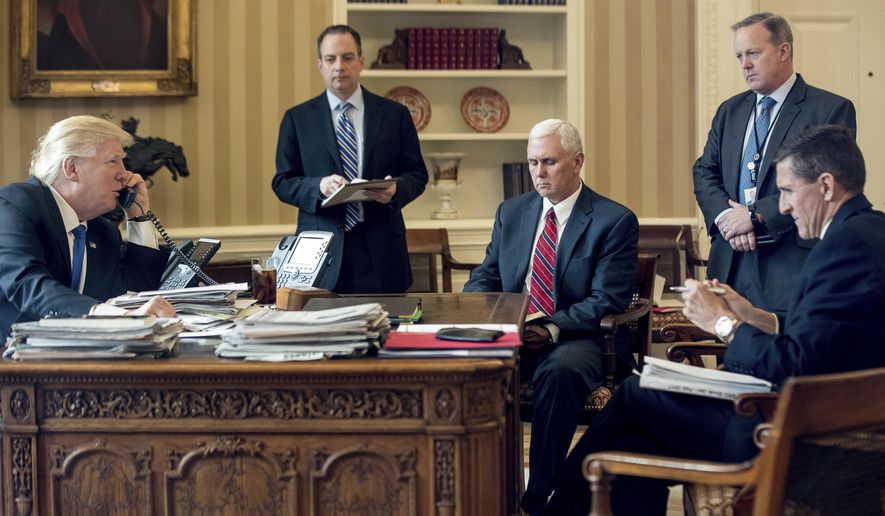President Trump has confronted “an unprecedented wave of potentially damaging leaks of information that threaten national security” since taking office, at the pace of a damaging leak a day, a congressional survey has found.
Shining a spotlight on an aspect of the Russian hacking probe that Mr. Trump’s defenders say has received far too little attention, the Senate Homeland Security and Governmental Affairs Committee survey released Thursday looked at leaks contained in a wide range of articles by “major national news organizations” published from Mr. Trump’s inauguration on Jan. 20 to May 25.
The 24-page report, titled “State Secrets: How an Avalanche of Media Leaks Is Harming National Security,” focused on 125 articles containing high-profile disclosures of the nation’s most sensitive information, including classified investigations, private statements and other data related to national security — and found leaks at the “rate of one a day” — “seven times higher than the same period during the two previous administrations.”
Mr. Trump, in press briefings and on Twitter, has repeatedly denounced the accuracy and propriety of the leaks, many of which have dealt with confidential details of the Russia probe or with sensitive internal White House conversations or talks with world leaders.
While many of the most damaging leaks were related to multiple probes of suspected Russian meddling in the November presidential election, the report adds that “the leak frenzy has gone far beyond the Kremlin and has extended to other sensitive information that could harm national security.”
“President Trump’s private conversations with other foreign leaders have shown up in the press, while secret operations targeting America’s most deadly adversaries were exposed in detail,” the report said.
The report, compiled the staff of the committee’s majority Republicans, tallied major leaks in 18 news outlets during the period studied, “sourced to virtually every possible permutation of anonymous current and former U.S. officials, some clearly from the intelligence community.”
One article, the authors noted, “cited more than two dozen anonymous sources.”
“In short, the unauthorized disclosure of certain information can cost American lives, and our laws protecting this information provide for harsh punishments when violated,” the report states.
Even before becoming president, Mr. Trump denounced Washington’s culture of leaks based on unidentified sources. Since taking office, he has lashed out at efforts by what he sees as the Washington establishment trying to undermine his policy agenda through strategically timed leaks to friendly reporters.
After returning from his first overseas trip in late May, Mr. Trump lashed out on Twitter.
“It is my opinion that many of the leaks coming out of the White House are fabricated lies made up by the #FakeNews media,” he wrote.
Even Mr. Trump’s critics have weighed in. Former CIA Director John O. Brennan took a moment from recent congressional testimony on Russia to denounce how leaky Washington has become since the election. The three-decade veteran of the CIA specifically cited details and quotes that seeped out after an Oval Office meeting in May between Mr. Trump and Russia’s ambassador and foreign minister.
“These continue to be very, very damaging leaks, and I find them appalling, and they need to be tracked down,” said Mr. Brennan, adding that leaks were national security threats.
Leaks have dominated many of this year’s major political stories, fueling partisan innuendo and national feelings of divisiveness.
Some Washington insiders say it reached a crescendo during Mr. Trump’s firing of FBI Director James B. Comey.
Mr. Comey admitted to using a third party — a friend who taught at Columbia Law School — to leak to the media private memos he wrote after his meetings and phone calls with Mr. Trump. The memos recounted Mr. Comey’s account that Mr. Trump tried to pressure him privately to drop the FBI’s investigation into former National Security Adviser Michael Flynn.
The case of Mr. Flynn began with the leak of a transcript of an intercepted phone call with Russian Ambassador Sergey Kislyak.
Leaking has woven its way into another unpopular narrative: the accusation by Republicans that Obama-era National Security Adviser Susan E. Rice — and other top officials from the Obama White House — inappropriately identified, or “unmasked,” American citizens caught up in U.S. intelligence intercepts of foreign figures under surveillance in the Russia probe.
Mr. Flynn could have been one of those unmasked — with the contents of the unmasking then leaked.
Leaks also have damaged relationships between U.S. and U.K. intelligence communities after American media revealed the leaked identity of Britain’s deadliest suicide bomber in a decade. British authorities accused the United States of revealing sensitive information shared about the terrorist who launched an attack at a Manchester pop concert that killed at least 23 adults and injured 250.
The report cites legitimate whistleblowers and note that America’s “free press and honest, open government are among our most sacred traditions.” But, the report goes on to note, there needs to be a balance between the free flow of information and “keeping our country safe.”
• Dan Boylan can be reached at dboylan@washingtontimes.com.




Please read our comment policy before commenting.